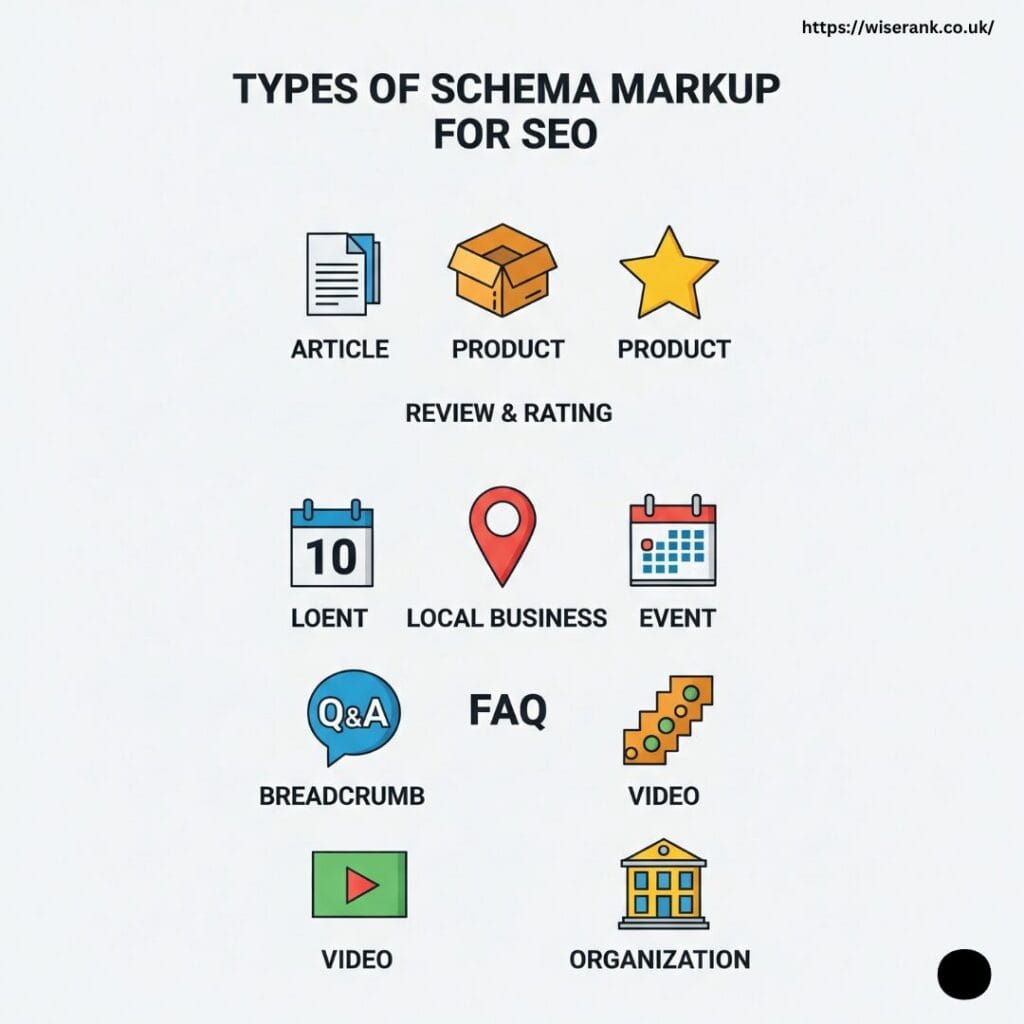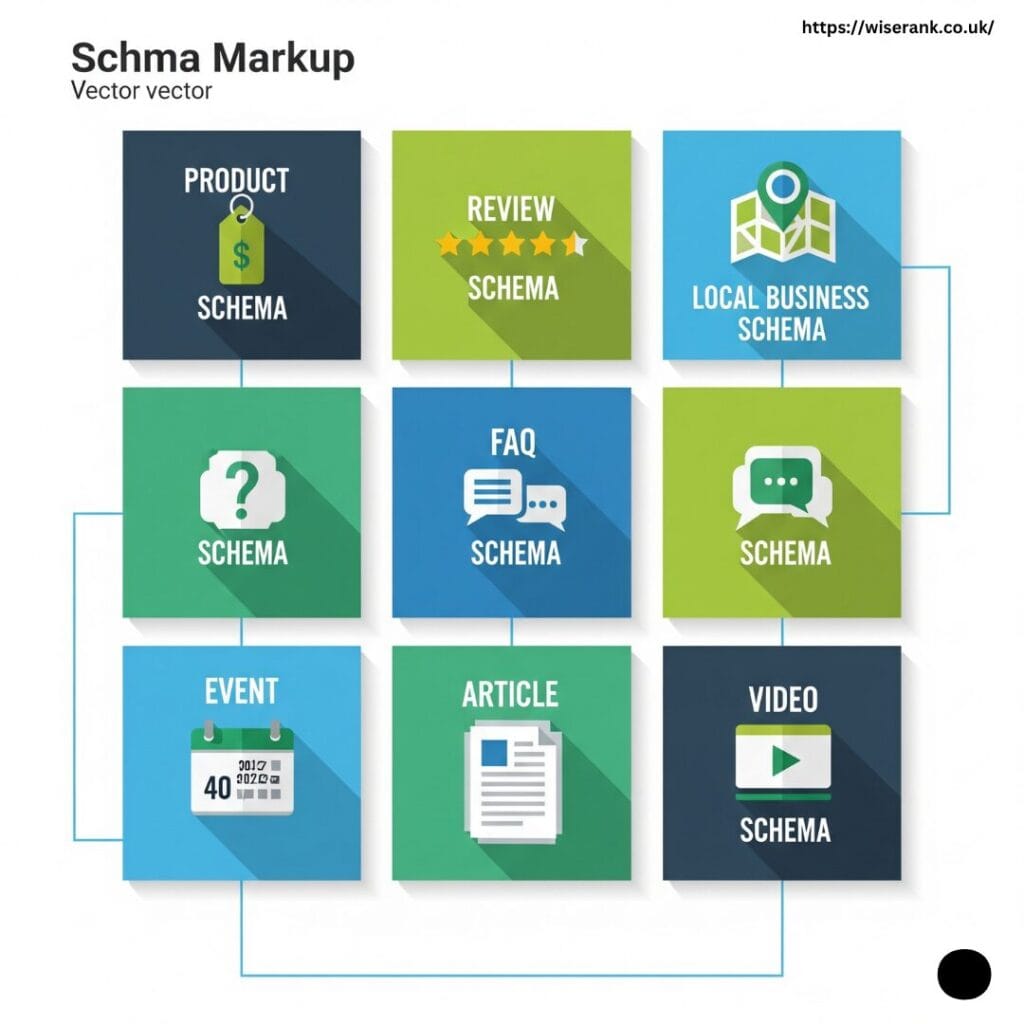Introduction: What is Schema Markup in SEO?
Schema markup for SEO — also called structured data SEO — is a special type of code that helps search engines understand the content on your website more effectively. It is based on Schema.org vocabulary and can be implemented using JSON-LD, Microdata, or RDFa.

When you use schema markup correctly, Google and other search engines can display rich results (also known as rich snippets), such as star ratings, event dates, product prices, FAQ accordions, breadcrumbs, and more. This improves click-through rates (CTR) and makes your listing more eye-catching.
Why Schema Markup Matters for SEO?
Without schema markup, search engines may have to “guess” the meaning of your content. With it, you’re directly telling Google:
- “This is a product.”
- “This is a review with 4.8 stars.”
- “This event happens on August 20, 2025.”
Benefits include:
- Enhanced visibility in SERPs (Search Engine Results Pages)
- Improved CTR through rich snippets
- Better local SEO performance with LocalBusiness schema
- Qualification for Google’s rich results & featured snippets
- Improved semantic SEO for AI-powered search (AEO)
How Schema Markup Works?
Schema markup uses a shared vocabulary from Schema.org. Search engines like Google, Bing, and Yahoo use this vocabulary to interpret and index your content with more context.
For example:
If you have a recipe blog post, adding Recipe schema tells Google exactly what’s in the dish, how long it takes, ingredients, calories, and even cooking instructions.
Types of Schema Markup for SEO
There are hundreds of schema types, but here are the most impactful for SEO:
1. Article Schema
- Used for blogs, news articles, and guides
- Helps Google show headlines, images, and publication dates
2. Product Schema
- Ideal for eCommerce SEO
- Shows product name, price, availability, and ratings
3. Review & Rating Schema
- Displays average ratings and total reviews in search results
4. Local Business Schema
- Improves local SEO by showing your business address, contact info, and opening hours
5. Event Schema
- Shows event name, location, and date directly in search results
6. FAQ Schema
- Adds expandable questions & answers under your search result
- Great for AEO because it answers user queries directly
7. Breadcrumb Schema
- Helps search engines display a clean breadcrumb trail in search results
8. Video Schema
- Improves chances of your videos appearing in Google Video search
9. Organization Schema
- Shows company name, logo, and contact details in the knowledge panel
Best Practices for Implementing Schema Markup
To make schema markup for SEO effective, follow these steps:

- Choose the Right Schema Type
- Use Product schema for products, FAQ schema for Q&A pages, etc.
- Use JSON-LD Format (Preferred by Google)
- Easier to implement without affecting the HTML structure
- Validate Your Schema
- Use Google’s Rich Results Test or Schema Markup Validator
- Avoid Spammy or Irrelevant Markup
- Only mark up content visible to users
- Keep Your Markup Updated
- Outdated product prices or event dates can hurt SEO
Schema Markup for Local SEO
If you’re a local business, schema markup can significantly improve your visibility in local searches and Google Maps.
Key Local Schema Types:
- LocalBusiness — Basic info like address, phone number, hours
- GeoCoordinates — Exact map location
- PostalAddress — Complete contact details
- OpeningHoursSpecification — Accurate business hours
With correct local business schema SEO, your listing stands out in the “local pack” results.
Schema Markup for Ecommerce SEO
For online stores, structured data for ecommerce is a must. It can:
- Show product price, stock availability, discounts in SERPs
- Increase trust and click-through rates
- Improve rankings for product searches
Best ecommerce schemas:
- Product schema
- Offer schema
- AggregateRating schema
- Review schema
How Schema Markup Improves Click-Through Rates?
Rich snippets attract more attention. Studies show that schema markup can boost CTR by up to 30% because:
- Users see more useful information before clicking
- Search listings look more professional and credible
- Visual elements like stars and images stand out
Schema Markup Tools & Resources
Here are tools to help you create, test, and implement schema markup:
- Google Structured Data Markup Helper
- Google Rich Results Test
- Schema.org official documentation
- Mer Schema Markup Generator
- Yoast SEO or Rank Math plugins for WordPress
- Screaming Frog SEO Spider to audit structured data
Common Schema Markup Mistakes to Avoid
- Adding markup for content that doesn’t exist on the page
- Using wrong schema types for your content
- Not updating schema data regularly
- Forgetting to test after implementation
Step-by-Step: How to Add Schema Markup to Your Website?
- Identify which schema type you need.
- Generate JSON-LD code using a markup generator.
- Add the code to your page’s
<head>section. - Test using Google’s Rich Results Test.
- Monitor in Google Search Console for errors.
Schema Markup and AI Search (AEO)
Schema markup is crucial for Answer Engine Optimization (AEO).
AI-powered search engines like Google SGE, Bing Copilot, and ChatGPT rely on structured data to deliver direct answers.
Adding FAQ schema, HowTo schema, and Organization schema improves your chances of being featured in AI-generated answers.
Why Choose Wiserank for Your Schema Markup SEO?
At Wiserank, we specialize in schema markup implementation and structured data SEO for businesses of all sizes.
Here’s why clients trust us:
- Full-Service SEO Expertise — We handle technical SEO, on-page, off-page, and structured data optimization.
- Proven Results — Our clients see more rich snippets, higher CTRs, and better rankings.
- Tailored Solutions — We select schema types that best match your industry and goals.
- Data-Driven Approach — We validate every schema with Google’s Rich Results Test and monitor ongoing performance.
Whether you need schema markup for local SEO, ecommerce SEO, or AI search optimization, Wiserank delivers measurable results.
Final Thoughts
Schema markup for SEO isn’t optional anymore — it’s a must-have for improving search visibility, click-through rates, and AI search presence. By implementing the right schema types correctly, you make it easier for search engines and AI systems to understand your content.
If you want to boost your rankings and unlock the power of rich snippets, partner with Wiserank and let us handle your structured data strategy while you focus on growing your business.






